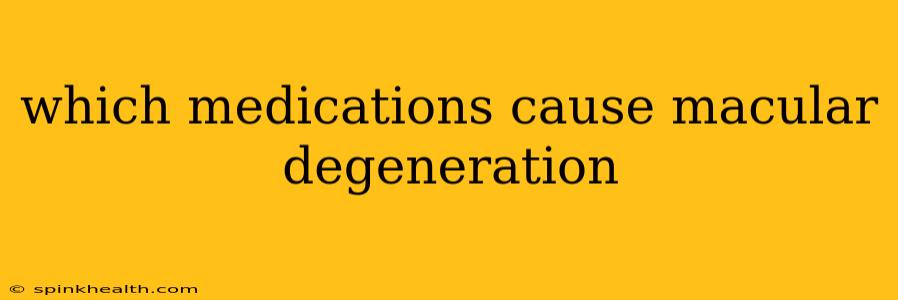Which Medications Cause Macular Degeneration? A Deep Dive into Drug-Induced Retinal Damage
Macular degeneration, a leading cause of vision loss in older adults, is often associated with age and genetics. However, surprisingly, certain medications can contribute to its development or worsen existing conditions. This isn't to say these medications cause macular degeneration outright, but they can increase your risk or accelerate its progression. Understanding which medications carry this risk is crucial for proactive eye health.
Let's embark on a journey into the world of pharmacology and ophthalmology, exploring the intricate relationship between medication and macular degeneration. This isn't a comprehensive list, as the effects can be complex and vary from person to person, but it highlights some key culprits. Always consult your doctor or ophthalmologist before making any changes to your medication regimen.
Can certain medications damage the macula?
Yes, certain medications have been linked to an increased risk of macular degeneration or related eye problems. The damage isn't always direct; sometimes it's an indirect effect, such as causing inflammation or blood vessel changes in the eye. The severity depends on factors like dosage, duration of use, and individual susceptibility.
What are some medications that might increase the risk of macular degeneration?
This is where things get nuanced. There isn't a definitive list of medications that directly cause macular degeneration, but research points towards a correlation with certain drug classes. These include:
-
High-dose antimalarials: Some antimalarial drugs, particularly when taken in high doses for extended periods, have been associated with retinal toxicity. This can manifest as changes in the macula, potentially leading to vision impairment. This is often a side effect of chronic use in conditions like lupus.
-
Certain cardiovascular medications: While not directly causing macular degeneration, some cardiovascular medications, especially those affecting blood pressure and blood vessel function, might indirectly influence retinal health. This is a complex relationship and requires further research to fully understand the mechanisms involved.
-
Antipsychotic medications: Some studies suggest a potential link between long-term use of certain antipsychotic medications and an increased risk of certain eye problems, potentially including changes in the macula. Again, more research is needed to establish a definitive causal link.
-
Chemotherapy drugs: Some chemotherapy drugs are known for their potential side effects on various body systems, including the eyes. While not all chemotherapy drugs impact the macula, some can increase the risk of retinal damage. This is often monitored carefully during treatment.
Does chloroquine cause macular degeneration?
Chloroquine, a medication used to treat malaria, is one drug that has been directly linked to a specific type of macular degeneration called chloroquine retinopathy. This is a serious side effect that can result in irreversible vision loss. Modern medical practice carefully monitors chloroquine usage and typically opts for alternative medications when possible, particularly with long-term treatments.
Are there other medications linked to eye problems?
Beyond the medications directly mentioned above, various other drugs can potentially impact eye health. This highlights the importance of regular eye exams, particularly if you're on long-term medication. Any medication that affects blood pressure, blood vessels, or the immune system could theoretically have an indirect impact on retinal health.
How can I protect my eyes while on medication?
The best way to protect your eyes while on medication is to maintain open communication with your doctor and ophthalmologist. Regularly scheduled eye exams, especially if you are on long-term medications, are crucial. They can monitor your eye health for any changes and adjust your medication or treatment plan accordingly.
Disclaimer: This information is intended for educational purposes only and does not constitute medical advice. Always consult your doctor or ophthalmologist before making any decisions about your health or medication. The information provided here should not be considered a substitute for professional medical care.

